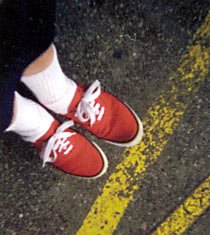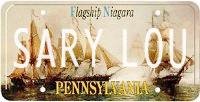...It has been considered the most fundamental activity of the human mind.
— "Cataloguing and Classification: An Introduction"
Lois Mai Chan
One in a small set of librarian based posts...
If you are a librarian, you're probably aware of an Arizona library that has eschewed classification and has a "Dewey-less" collection.
Laura and I were talking about this at the desk yesterday and we thought it must be a small library if they think they can get away with "history" on their spines as a way to class books (there was a picture in the Wall Street Journal article.) I'll link this later, but for now, you can visit Jessamyn, she's (of course, woo hoo!) quoted in the article.
Okay, here are the two Jessamyn posts so far: the one with more information on the background (which makes me feel kinder towards the Arizona libraries), and the one that links to the WSJ article.
Having worked in a large bookstore for 7 years of my professional life and a library for almost 5 now, there are some things I prefer about the bustle of a bookstore. The new books, the beautiful displays, the long Saturday hours.* However, as far as classification, there is something calming about the DDC (Dewey Decimal Classification). You know where a book goes. You're not yelling at the folks in New York who put tattoo books in Sociology (which is also where they put Sex and the City, go figure.)
At my library, we have a huge cookbook section. If we used the bookstore model, it's possible that all the books on "cooking for one" would not be all in one place. It's a small enough collection of books that if you aren't classing them numerically might seem too small to make a separate label for. (I can't speak for how they are handling small sections like that.) (And I KNOW you're not supposed to end a sentence with a preposition.)
I remember when Feng Shui was one book, in 1994. And then it was a section. And so we were CONSTANTLY labeling and re-labeling, and re-labeling and re-labeling. And New York woud send us new "signage." Dewey is pretty constant, and while we do re-class books, it's based on a system that has worked for decades. And while Dewey, the man, has been dead a long time, his system is managed by librarians who know what they're talking about.
The misconception about Dewey is that you have to know the numbers to know how to find stuff. No, that's the beauty of it. If your nice librarian takes you over to the section, or you read the subject labels on the ends of the shelves, all your books on caterpillars are going to be right together. I know, because it's how I found them, yesterday. You can browse. The numbers help the books stay where they should be, but you don't have to pay attention to them if you don't want to. They just mean that all your Titanic books should be in one place. AND that when you leave the Children's Dept, and go upstairs, you can go to the same number area (so I guess you have to pay a LITTLE attention to the numbers) and find MORE books on the Titanic or caterpillars.
I think we need more education on this--patrons ARE afraid of Dewey, but they wouldn't be, I think, if they understood that it's what WE librarians do so that YOU patrons can find stuff.
Just one librarian's opinion...
_______
*But as a librarian, I'm better paid, I get to go to conferences, and I get to do lots of fun programming. So am I happier now than I was four years ago? YES!! Also, the bookstore world has changed TONS since I left it, and so even if I went back, it would never be as fun as it was in 2001. (And I'm not kidding about long Saturday hours--working the 3 pm-10:30 pm shift meant I could go to the farmer's market on Saturday. Working 9-5 means, no, unless you want to get up at five AM.)
3 years ago


6 comments:
I was talking about classification with an employee of Hastings. She was irritated that when a book came out in hard cover and was placed say in history, when it came out in paperback it could be place in True crimes. If a book isn't where I think it should be I don't waste my time, I just ask.
I can see positives to both. I do wish our local library would shelve the "celebrity" cookbooks alphabetically by author, but otherwise the DDS is a-okay with me.
I like the Dewey system in libraries because I like to look on the computer catalogue, write down the call number and then find it right on the shelf. I did a lot of research in university libraries and am very comfortable with it. But really I think I just like libraries - and librarians of course!
And thanks for the tip off re HP7 spoilers a few posts ago :-)
Celebrity cookbooks by author--that is BRILLIANT! I'll check to see how ours are. Do you mean like the Susanne Somers and Marilu Henner ones though (which are more lifestyle) or like Amy Sedaris' book on hospitality...this looks like something to keep me occupied at the desk today...
Glad to be among folks that like libraries and librarians, of course!
I mean I want all of Jamie Oliver's cookbooks together, all of Nigella Lawson's cookbooks together, all of Ina Garten's cookbooks together -- like that.
If, for example, Jamie Oliver did a "family dinners" cookbook and a "how to" cookbook and a "grilling" cookbook, they'd all be scattered around the cooking section because of the DDS. I want them TOGETHER, like in the bookstore. Because I don't necessarily want to read a how-to book by Jamie Oliver; I want to read Jamie Oliver's how-to book. If you see the difference.
Badger,
I totally see what you're saying.(Isn't Jamie Oliver so cute!!) I don't know how we do that, I'll look into it. What you're saying makes sense, though.
SL
Post a Comment